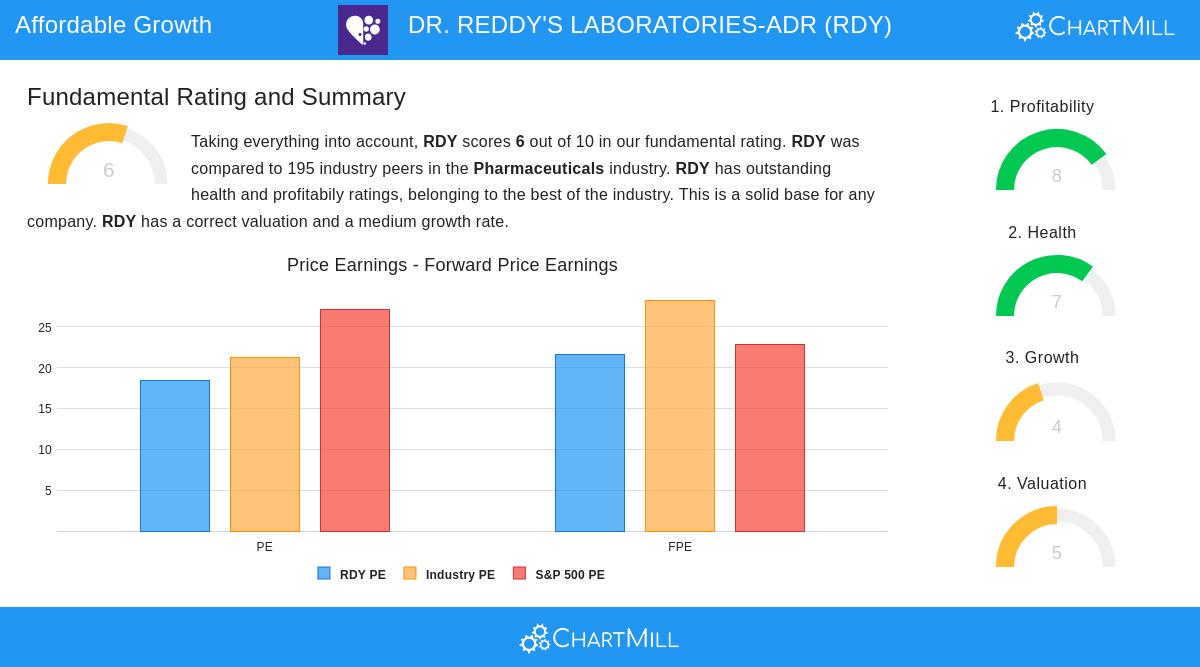For investors looking for a systematic method for long-term appreciation at fair prices, the investment philosophy of Peter Lynch offers a useful framework. Lynch, who notably achieved 29.2% average yearly returns while managing Fidelity’s Magellan Fund, stressed investing in companies with good fundamentals, lasting growth, and fair valuations, principles that match closely with what is now frequently called GARP (Growth at a Reasonable Price) investing. His method avoids speculative high-growth picks for businesses that mix profitability, financial stability, and growth opportunity, all while staying clear to the average investor.

One company that recently appeared in a screen built on Lynch’s criteria is Dr. Reddy's Laboratories Ltd. (NYSE:RDY), a worldwide pharmaceutical company based in India. The screen uses a number of quantitative filters taken from Lynch’s published methodology, each intended to find companies with lasting business models and shareholder-positive traits.
Here’s how Dr. Reddy’s matches those ideas:
-
Lasting Earnings Growth: Lynch liked companies with a steady history of earnings growth, preferably between 15% and 30% per year, quick enough to fuel compounding returns, but not so fast as to be unstable. Dr. Reddy’s has achieved a 5-year EPS growth rate of 23.6%, putting it directly within this ideal range. This shows the company’s capacity to grow its portfolio of generic drugs, biosimilars, and active pharmaceutical ingredients in a developing global market.
-
Fair Valuation Compared to Growth: A key part of Lynch’s method is the PEG ratio, which measures a company’s price-to-earnings multiple against its growth rate. A PEG under 1 implies the stock could be undervalued considering its growth path. Dr. Reddy’s PEG ratio of 0.78 shows that its present valuation does not exaggerate its past growth, providing a margin of safety that Lynch viewed as important.
-
Good Profitability and Effective Capital Use: Lynch gave high priority to return on equity (ROE) as a gauge of management’s skill. Dr. Reddy’s ROE of 16.9% is above the 15% level Lynch suggested, indicating effective use of shareholder capital and a profitable business. This is also shown by good returns on invested capital and stable operating margins.
-
Stable Financial Health: To steer clear of companies with too much debt, Lynch favored businesses with little borrowing. Dr. Reddy’s debt-to-equity ratio of 0.02 is not only far under the screen’s maximum of 0.6 but also shows a cautiously financed balance sheet. Also, the company’s current ratio of 1.92 indicates sufficient short-term liquidity, lowering operational risk.
-
Business Model Understandability: While not a number-based factor, Lynch advised investors to know how a company earns money. Dr. Reddy’s works in the generics and specialty pharmaceuticals field, a sector with steady demand drivers, regulatory structures, and long product cycles. Its attention on chronic therapy areas like gastroenterology and cardiology gives clarity into future cash flows.
Apart from these screen-based measures, a review of Dr. Reddy’s fundamental report supports its status as a financially stable company. The report points out very good profitability and health scores, with high grades for return on assets, operating margin, and solvency. Although short-term earnings growth is predicted to slow, the company’s firm market position and careful capital allocation back its long-term outlook.
It is important to mention that while screens help find possible candidates, Lynch emphasized the need for additional study, evaluating competitive strengths, management skill, and industry direction, before making an investment.
For investors wanting to research other companies that fit similar standards, the Peter Lynch strategy screen is refreshed often and gives a functional beginning for creating a watchlist.
,
Disclaimer: This article is for informational purposes only and does not constitute investment advice. The mention of any security is not a recommendation to buy or sell. Investors should conduct their own research and consult with a qualified financial advisor before making investment decisions.



